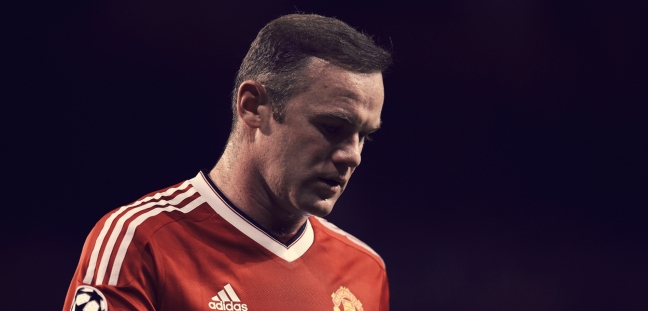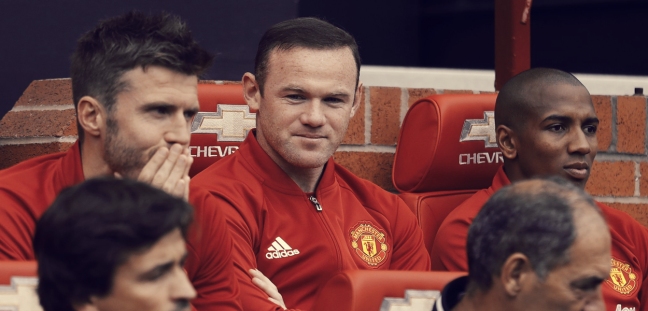The narrative of Wayne Rooney’s career has always been complex. It had to be for the leading English talent in a generation. From boy wonder to Manchester United’s elder statesman; transfer rebel to declining force. Rooney has rarely suffered for a shortage of unsolicited analysis.
Despite the criticism attached to Rooney, in a period of diminishing returns, the Scouser is likely to end his career as England and United’s finest goal scorer. More than a decade on from that 25-yard strike against David Seaman’s Arsenal – the one announcing Rooney to the world – the striker remains omnipresent in the conversation.
Rooney is a player, and a man, whose story defies simple construct precisely because he has spent a career living with the labels attached by others: street ‘baller, working-class hero, the White Pele. Consumer of prostitutes, lover of the geriatric, family man and doting father. The most natural player England has produced since Paul Gascoigne; and perhaps, like the Geordie, an abuser of his talent as well.
It was a moment more than three years in the making. Ever since Sir Alex Ferguson swung his axe in the striker’s direction in 2013, Manchester United fans were introduced to the idea of life after Wayne Rooney. It has taken longer than Ferguson would have envisaged, but following a series of abject performances by the striker, José Mourinho finally elected to relegate an ailing Rooney to the bench.
United fans have watched their club endure a chastening fall from grace in recent times. There are few players who haven’t suffered an extended period on the sidelines following a particularly poor result. By virtue of reputation and ownership of the captain’s armband, Rooney has been safe. Manchester United fans have clung steadfastly to the notion that Rooney’s presence was a major hindrance to the wealth of talent now present in the squad. But now with the wish granted, the Old Trafford faithful had to close their eyes and pray that they had been right all along. The idea that United may not be actually be any better without the beleaguered captain must have crossed the minds of many, yet few dared mention it.
To go, or not to go

To go, or not to go that is now the question. From the moment Jose Mourinho called time on Wayne Rooney’s special privileges at Manchester United the clock began ticking on the Scouser’s Old Trafford career. The inevitable is nigh. Now the club, although not publicly, is pushing Rooney towards a more rapid exit than previously imagined. China calls; will Rooney pick up next season?
Money on both sides may dictate the eventual outcome, but so does Rooney’s diminished playing status, political clout, and Mourinho’s short-term requirements. And while the transfer business has long been grubby, the complexity of a quick move is exacerbated by thoughts of moving on United’s record goalscorer, in the middle of February, with the club still competing on four fronts.
The sums on offer would tempt many not just a player for whom peak remuneration has long been a topic of high concern. The rewards: tens of millions tax-free to join a Super League club, with the player’s representatives having already spoken to Tianjin Quanjian.
Once considered a laughable proposition, few should now be surprised if Rooney takes up the offer. After all, the player has twice held United to ransom over new contracts, first in 2010 when the player was seemingly keen to take up an offer from Manchester City, and then in 2013 when David Moyes’ desperation was expertly manipulated by team Rooney. Few have gone for the love, not yet at least, but an increasing number of players still at their peak are willing to accept a lower standard in return for staggering sums. In recent times Carlos Tevez, Oscar, Axel Witzel and Hulk have all moved east. The Argentinean is now believed to be the world’s best-paid player, earning some £31 million per season. Rooney might eclipse that sooner or later if he moves to China.
Riding President Xi Jinping’s love of the game, China is pursuing a state-sponsored strategy to build soft power in the world’s most popular sport. First comes the players, then the infrastructure, and then, potentially, the 2026 World Cup, in a long-term plan to become a dominant actor in the game.
For United the financial calculation is simple. With Rooney’s contract running down, – he has 18 months plus an option on a final year – the player retains little residual transfer value. Rooney’s physical decline and minimal contribution means that a large fee for a sale to a European or MLS club is unlikely, while the player is guaranteed at least £18 million in basic wages over the course of the next 18 months. Moyes’ legacy has long been destructive, but it has proven to be expensive too. It may well be that United could not only command a premium fee for a transfer to China this month, but a bonus for moving the player on during the season.
It’s about the player’s career
Since being dropped by Mourinho back in September, Rooney has rarely been top-of-mind when it comes to the manager’s attacking options. Indeed, the player has not started a Premier League game since mid-December, and has secured just 1281 minutes across league and European games this season. To put that into perspective, Rooney is just United’s 12th most-used player in the league and ninth in Europe.
Even more stark is the limited chance Rooney now has to break back into the team. The Scouser is behind Zlatan Ibrahimović, Marcus Rashford and Antony Martial for a place as Mourinho’s number nine, while the manager considers Juan Mata and Henrikh Mykitaryan better options at 10. Rooney could be used in wide or central midfield positions, but Mourinho’s policy on that failed experiment has already been made clear.
It’s a steep fall for a player whose ego has grown through more than a decade of lionization at United.
In more recent seasons, Rooney has played on his seniority, first securing that hefty new contract under Moyes, and then enjoying “special privileges” as Louis van Gaal’s undropable club captain. It is fours year since Ferguson first realized Rooney’s goose was cooked at an elite level; the slide has been a long time coming.
Would Rooney consider playing out the next 18 to 30 months as an increasingly marginalized, if well remunerated member of Mourinho’s squad? The noises emanating from camp Rooney suggest not. There will be offers around Europe, including a potential return to Everton, while MLS has long been a destination for ageing Premier League stars. None offer the financial rewards available in China, but many would find a home for Rooney’s ample if declining assets.
Do Manchester United Need him?

In the short-term, Mourinho insists that he wants Rooney to remain at the club, with the Reds chasing Champions League qualification together with progression in the FA Cup and Europa League. Certainly, there appears little on-pitch benefit from reducing near-term options. Mourinho allowed Morgan Schneiderlin and Memphis Depay to move on during the winter, without augmenting his squad. It already leaves the Portuguese manager with one of the thinnest squads in the top six before any talk of shipping Rooney out is broached.
Yet, reports that Mourinho has frozen Rooney out not only of the team, but increasingly his thinking resonates. The manager has little time for those who do not contribute, and unlike Antony Martial and Mkhi, there is little to suggest a resurgence in Rooney’s form is probable, if even possible. The player’s physical decline is years in the making, and his rustiness without game-time long-noted. The best Rooney can hope for is the odd late, potentially impactful, cameo.
The politics of legendary
Yet, none of this debate takes place in a vacuum. Rooney is not just another player; not after surpassing Sir Bobby Charlton’s record of 249 goals and amassing more than 500 appearances for the club. The player was once the prodigious teenager, eager to learn from the club’s elders. Now he is a revered icon within the dressing room, the face of a thousand marketing campaigns and, in the parlance of the day, a “club legend.”
That Rooney brand is perhaps more valuable in China now than it is for United. Not least with Ibrahimović, Paul Pogba and Mkhitaryan offering ample scope for international partnerships.
Nor can Mourinho be seen to push the player out against his will. The manager’s bank of credit is not yet that rich, although the Portuguese has shown little reticence in jettisoning expensively acquired, yet failing stars during his nine months at the helm. Mourinho can be pleased with his handling of Rooney this season, easing the player out with the minimum of political blowback.
In the context, a summer move appears more likely, even if Old Trafford’s bean counters might ponder the benefits of greater rapidity.
Teenage Rooney was a scorer of great goals and then even greater goals still. His game was at once a burst of electric excitement and, yet, refined beyond its years. On the pitch, Rooney was a man, both physically and mentally, long before he left adolescence. The player’s first touch was outstanding, despite contemporary evidence to the contrary, and his vision as finely tuned as any on the continent. Little wonder the game’s great and good saw much in the 16-year-old. It is a world away from Rooney the effervescent kid, who plucked the ball out of the air without a second thought, and curled a strike past David Seaman with a rare nonchalance. It was a great moment, no matter to whom one’s allegiance lies.
To go, or not, might be the question. Timing is the only real answer.

